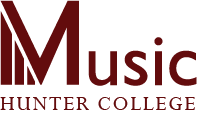Prerequisites
Admission to all M. A. programs requires a Bachelor’s degree from an accredited college. In addition to the general requirements for admission to graduate programs in Arts & Sciences of Hunter College, applicants must have completed an undergraduate concentration in music (with a minimum of 29 credits) or the equivalent; these 29 credits must include:
- three semesters of music history
- four semesters of music theory, and
- four semesters of musicianship (sight singing, ear training, and keyboard studies)
Samples of Works (for composers, Ethnomusicologists, Music Historians, and Music Theorists)
Submissions of Samples of Work Applicants who wish to be Composition, Music History, Music Theory, or Ethnomusicology students must present samples of their work in the area in which they wish to concentrate. (Samples of papers or compositions are not required for prospective Performance students).
- Students who want to concentrate in Composition should contact the Director of Graduate Studies about the submission of their composition portfolios.
- Students who want to concentrate in Ethnomusicology, Music History, or Music Theory should submit one or two sample research papers on a musical subject, which can be done in the application process.
- Students who want to concentrate in Music Theory might also consider sending music-theoretical work, such as choral harmonizations, figured bass realizations, or short compositions. Music Theory applicants must also must arrange for an interview, during which they will be given a brief dictation exam and a diagnostic exam in music theory. Applicants in music theory should contact the Music Department Graduate Adviser to arrange for this interview.
Auditions
Applicants to the Performance concentration must audition. Auditions are held on two or three different dates each semester. To register for an audition, prospective students must:
- send in an official application to the Admissions Office, and
- fill out the online audition registration form.
- Audition repertoire for the M.A. in Classical Instrumental or Vocal Performance should consist of a program of three or four representative works from different style periods. Singers preparing an audition in classical voice should prepare songs and/or arias in at least three languages with at least one selection from the 20th and 21st century repertoire. This could include Western and Eastern European languages as well as Asian languages. Audition repertoire for the M.A. in Jazz Performance should consist of a program of three selections that demonstrate fluency in a variety of styles and tempos.
- Students auditioning for an M.A. in Jazz Performance must include at least one selection that is fully or mostly notated and one selection that demonstrates their ability to improvise.
Application
To apply to Hunter, prospective students must complete and send in the official application provided by the Admissions Office. Applications can accessed at: http://www.hunter.cuny.edu/graduateadmissions/applying. The Admissions Office will require prospective students to forward transcripts from their previous school(s), a statement of purpose, and two letters of recommendation, among other things. The final decision regarding each application is made by the Admissions Department, based largely on the recommendation of the Music Department.
Application Deadlines
Admission deadlines may be found at http://www.hunter.cuny.edu/graduateadmissions/applying/deadlines/degree-applications. Deadlines for international students and students who have earned any college credits at non-U.S. institutions are approximately two months earlier than these dates.
GRE Examinations
While there are no GRE exams required for prospective M.A. students in performance, composition, or the academic areas, the School of Education requires the GRE for all Music TEP applicants.
TOEFL
Students whose native language is not English and/or whose post-secondary education was in a country where English in not the native language must take a Test of English as a Foreign Language (TOEFL). For further direction concerning the TOEFL consult the Office of Admissions.




